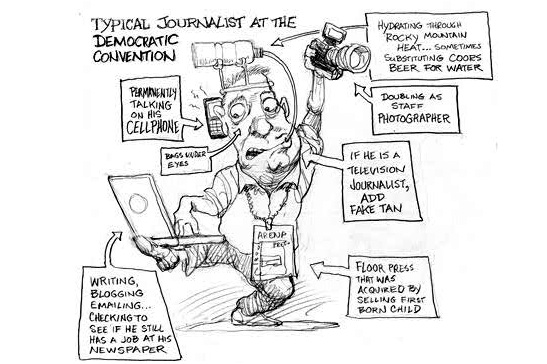My column in this week’s Time is about John Mackey, the CEO and co-founder of Whole Foods Market, and Kip Tindell, the CEO and co-founder of the Container Store, and their shared belief that corporations perform a lot better over time if their executives focus more on employees and customers than on shareholders.
Mackey and Tindell go way back–they shared a house in Austin with three friends one year in the mid-1970s as they worked their way through the University of Texas on the eight-year plan. They’ve recently begun hanging out together a bit, and when I met Tindell at a National Retail Federation event in New York late last year, he invited me to come down to Texas to talk to the two of them. So I did. We met at Whole Foods’ headquarters in Austin, which is perched atop the chain’s flagship store, and we talked, and talked. Tindell is stereotypical laid-back, slow-talking Texan. Mackey is a not so stereotypical hyper, fast-talking Texan. But they seemed to get along pretty well. As for me, I mostly just stayed out of the way.
What follows is an edited transcript of the conversation. I cut some stuff out, moved a few passages around, and removed a lot of “uhs” and “you knows” (mine as well as theirs). Beyond that it’s a pretty faithful representation of what was said. It’s pretty long, too. But most educational.
Sunrise: Madison “Beltline” Highway

Sunrise, Labor Day 2008

Fitchburg, WI
Vintage, Classic Cadillac
 1940’s?
1940’s?
Political Cartoonist KAL at the Democratic Convention

Every day this week, our cartoonist is sending his sketches from the Democratic convention in Denver, Colorado. Sketches from previous days can be found here. You can find up-to-the-minute coverage on our American politics blog.
Beijing’s Ghost Town
About ten hours after the end of last night’s closing ceremony, I headed to the Olympic Green, completely unsure of what I’d find when I got there. I hadn’t heard much about when the Green will open to the ticketless public, or if it would stay open until the Paralympics — so I knew it would either be packed to the brim, or completely deserted. I arrived to find the latter.
When I approached the Olympic subway line, the streets packed with tourists and scalpers just yesterday were now empty, and only one of dozens of security checkpoints to access the subway was open — and there wasn’t even anyone in line. Unsure if my accreditation card would still be valid, I approached the checkpoint to find a guard waving me through. Two of the guards were even taking a nap — it was obvious that I was their first customer for quite some time.
A narrated slide show on the latest Texas Monthly Cover
Five Ways Newspapers Botched the Web
Here’s our theory: Daily deadlines did in the newspaper industry. The pressure of getting to press, the long-practiced art of doom-and-gloom headline writing, the flinchiness of easily spooked editors all made it impossible for ink-stained wretches to look farther into the future than the next edition. Speaking of doom and gloom: Online ad revenues at several major newspaper chains actually dropped last quarter. The surprise there is that they ever managed to rise. The newspaper industry has a devastating history of letting the future of media slip from its grasp. Where to start? Perhaps 1995, when several newspaper chains put $9 million into a consortium called New Century Network. “The granddaddy of _______,” as one suitably crotchety industry veteran tells us, folded in 1998. Or you can go further back, to ’80s adventures in videotext. But each tale ends the same way: A promising start, shuttered amid fear, uncertainty, and doubt.
Dangerously in Debt
Former U.S. Comptroller General David Walker speaks out on the perils of the rising federal deficit in the new film “I.O.U.S.A.
If “An Inconvenient Truth” sounded the alarm on global warming, “I.O.U.S.A.,” a new documentary opening in theaters Friday, hopes to do the same for the rising federal deficit.
Backed by Blackstone Group Chairman Peter Peterson, “I.O.U.S.A.” follows former U.S. Comptroller General David Walker and the Concord Coalition’s Robert Bixby on a “fiscal wake-up tour” across America. In the movie, which is co-written by “Empire of Debt” co-author Addison Wiggin and directed by “Wordplay” filmmaker Patrick Creadon, Messrs. Walker and Bixby argue that unless the government alters its policies and spending habits, the U.S. will be in for a serious financial meltdown.
The Diver’s View
A beautiful vr scene from the diving platform in Beijing, host of the 2008 Olympic Games.
